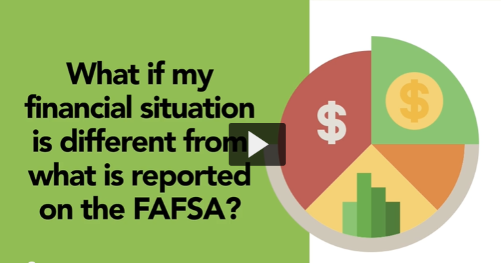Request a Review of Your Circumstances
The Student Financial Aid office understands that there are many personal and financial circumstances that impact a student's eligibility and need for financial aid. Through a documented review of your unique circumstances, our office may be able to adjust your financial information to reflect your current situation more accurately.
Please note that all requests are evaluated on a case-by-case basis, and while it is not guaranteed that a change in your financial aid will occur, we encourage students to inquire and apply. Below is what we evaluate:
- Changes in financial circumstances that differ from what was reported on your TASFA or FAFSA.
- Unique or high costs incurred that are not being included in your current estimated Cost of Attendance.
- Personal circumstances in the family that would make a dependent student, independent.
- Personal circumstances in the family that have caused the student to become Homeless (or at-risk).
- Personal circumstances in the family that result in a parent not completing the FAFSA and no longer providing financial support.
Steps to Request a Review
- Contact the Student Financial Aid office.
- Submit the review request form and all supporting documents via ACES.
- A Financial Aid Advisor will determine if an adjustment is supported by the documentation and communicate the outcome to the student.
Types of Reviews
Special Circumstances
These refer to financial situations that support an adjustment to a student's EFC, SAI, or Cost of Attendance.
An Income Reduction adjustment is a request by a student to consider the unique situations that have decreased the income for themselves and/or their household.
Financial situations we typically consider:
- Loss of employment or reduced income
- Loss of unemployment or compensation benefits
- Separation/divorce
- Death of a parent or spouse
- Disability of parent or spouse
- Unusual medical, dental, vision expenses during the current academic year
Note: if a student already has the lowest possible Expected Family Contribution (EFC) or Student Aid Index (SAI), there are no adjustments that can be made to increase their financial aid.
A Cost of Attendance (COA) adjustment is a request by a student to consider additional expenses they are experiencing that are not being included in their current estimated COA.
Cost of Attendance adjustments we typically consider:
- Educational expenses above the estimated COA
- Housing and food expenses above the estimated COA
- Transportation expenses above estimated COA (uninsured repairs or round-trip milage over 150 miles/week)
- Computer purchase expense (considered only once as an Alamo student)
- Unusual medical, dental, vision expenses during the current academic year
- Childcare or private school expenses for dependents during the current academic year
- Professional licensure/credential or certification costs
Unusual Circumstances
These refer to adverse conditions in a student's household that support adjusting the student's dependency status.
A Dependency Override is a request by a student to be considered "Independent" rather than "Dependent" as their FAFSA or TASFA originally determined.
Circumstances we would consider a student to be Independent:
- Relationship with parent being abusive
- Parental abandonment or having no contact
- Parental incarceration
- Human trafficking, refugee, or asylum status
Circumstances we would not consider a student to be Independent:
- Parent refuses to financially support them
- Parent refuses to fill out their information on the FAFSA or TASFA
- Parent does not include the student as a dependent on their taxes
- A student living independently or supporting themselves only
Other Circumstances
These are all other unique situations that support processing your FAFSA without parent information. The type of federal financial aid offered will vary.
An Unaccompanied Homeless Youth Determination is a notification from the student of their homeless or at-risk of homelessness living situation. The required documentation will verify their independent status reported on the FAFSA.
Circumstances we would consider a student to be an Unaccompanied Homeless Youth:
- A letter has been provided to the student by a homeless liasion of a local educational agency designated by the McKinney Vento Homelessness Assistance Act;
- A letter has been provided to the student by a director of an emergency or transitional shelter, street outreach program, homeless youth drop-in center, or other program serving individuals who are experiencing homelessness;
- A letter has been provided to the student by a director of a Federal TRIO program or a Gaining Early Awareness and Readiness for Undergraduate program (GEAR UP); or
- A letter has been provided to the student by a Financial aid official at another college who documented your circumstance this year or in the prior award year.
When an official letter from one of the officials above is not available, a documented interview with the Student Financial Aid office is offered so your situation may be reviewed. For additional guidance before reaching out, please view this helpful tip sheet.
A Parent Refusal form is a notification from the student and parent that all parental financial support has ended and that they will not fill out the parent section of the FAFSA.
- Our office accepts this form as a self-certification and will process only the student section of the FAFSA.
- The result is that the student can now request a Federal Unsubsidized loan to help cover their expenses.
- Students are not eligible for any other aid besides this loan.
Timeline
Requests must be submitted and processed before the last day of the term that you are enrolled in within an academic year.
Note: August and January are the busiest months in the Student Financial Aid office, and we cannot guarantee a review prior to the start of the term. Additionally, submissions during Alamo's winter break will not be reviewed until Spring.







